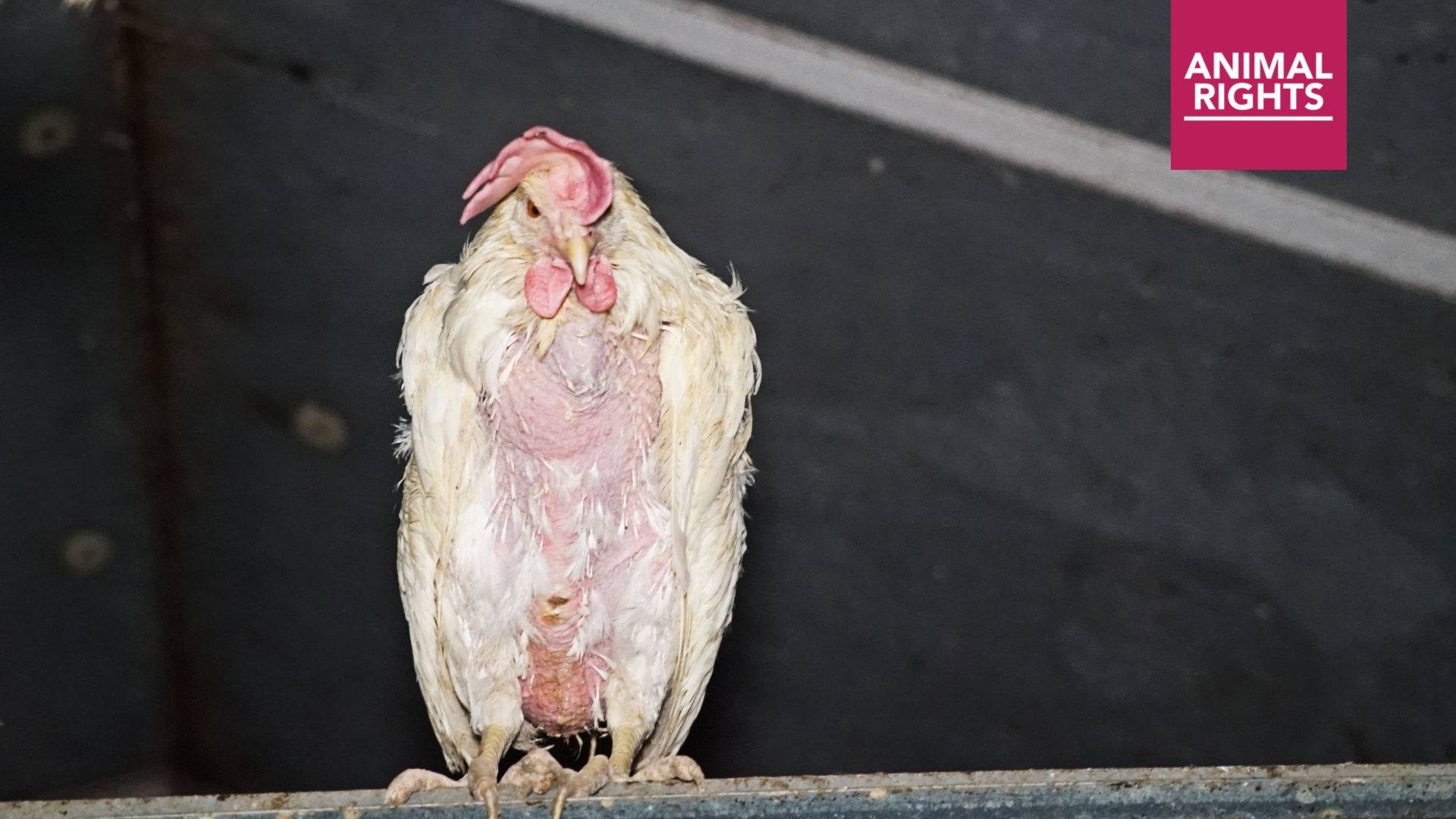Stranka za životinje prisiljava veliku raspravu o patnji životinja u stočarskoj industriji
On the Party for the Animals’ (PftA) insistence a big debate will be held in the Dutch Lower House on the suffering and dying of animals in the livestock industry. PftA’s parliamentary leader Esther Ouwehand: “A radical change of course is needed, involving a transition to an agriculture in which we do justice to animals.”

A chicken in a Dutch “horror stable” (picture by Animal Rights)
The debate will be held on the 24th of January next. The Dutch Party for the Animals wants to use this debate to force the Minister of Agriculture and colleague politicians to take a good look at themselves: when is the line crossed in terms of animals suffering in the livestock industry?
Several reports show structural malpractices in Dutch livestock farming. Last week it appeared that sows are so severely overbred to farrow as many piglets as possible that millions of piglets are suffering badly in the maternity barn. Ten years ago, the sector promised to push back piglet mortality, but those figures only grew after that. Additionally, the air in pig barns is so poisonous that more than half of the pigs in the Netherlands catch pneumonia.
The animal rights organisation Animal Rights recently published a series of videos of Dutch barns. Those prove that the reality for animals is completely different than what the livestock industry, supermarkets and government make it look like: bald and weakened chickens, which can hardly walk, among dead species in barns. Piglets and their mothers live above their own excrements on a concrete slatted floor in unfurnished, often dirty cages. The Association of Dutch Veterinarians ‘Caring Vets’ confirms that these type of practices are no exception but normal in everyday life in the livestock industry.
Esther Ouwehand of the Party for the Animals wants to have some crucial questions answered in the coming debate: “The key question is: How can those practices be legal? The follow-up question is: If this is legal, why are people not allowed to see it? Certainly if you make the customer responsible, you have the duty to inform them truthfully and completely about where their animal products come from. For that reason, the Minister must 1) acknowledge that there is a gigantic gap between the picture presented and reality in livestock farming and 2) to distance herself from the tactics of the sector to criminalise messengers such as Animal Rights. The right to information is a core value in a democracy.”
Na insistiranje Stranke za životinje (PvdD), u nizozemskom Zastupničkom domu će biti velika rasprava o patnji i smrti životinja u stočarskoj industriji. Vođa skupine PvdD Esther Ouwehand: “Potrebna nam je radikalna promjena smjera i prelazak u poljoprivredu u kojoj vodimo računa o životinjama.”

Kokoši u nizozemskoj “farmi strave” (fotografija Animal Rights)
Rasprava će se održati narednog 24. siječnja. Tijekom rasprave nizozemska Stranka za životinje želi da ministar poljoprivrede i kolege političari ispitaju sami sebe: kada će biti dosta patnje životinja u stočarskoj industriji?
Nekoliko izvješća pokazuje da postoje strukturne zloupotrebe u nizozemskom stočarstvu. Kako se pokazalo prošli tjedan, krmače su pretjerano uzgajane da okote što više prasadi i zato milijuni prasadi umiru u prasilištu. Prije deset godina, sektor je obećao da će preokrenuti smrtnost prasadi, ali se nakon ovih deset godina samo povećala. Osim toga, zrak u svinjcima je toliko otrovan da više od polovice svinja u Nizozemskoj ima upalu pluća.
Organizacija za prava životinja Animal Rights nedavno je objavila niz slika iz nizozemskih staja. Jasno je da realnost za životinje izgleda vrlo drugačije nego stočarski sektor, supermarketi i vlada potrošačima pokazuje: ćelavi i oslabljeni pilići, koji jedva hodaju, između mrtvih srodnika u stajama. Prasad i njihove majke žive iznad vlastitih fekalija na betonskom podu od rešetki u golim, često prljavim kavezima. Veterinarska organizacija Caring Vets potvrđuje da ove vrste prakse nisu iznimke, već uobičajena procedura u industriji stoke.
Esther Ouwehand iz Stranke za životinje želi odgovor na brojna ključna pitanja u predstojećoj raspravi: “Ključno pitanje je: zašto su te prakse legalne? Sljedeće pitanje je: ako je ovo legalno, zašto to ljudi ne mogu vidjeti? Pogotovo ako potrošača držite odgovornim, dužni ste pružiti iskrene i potpune informacije o tome odakle potječu njihovi životinjski proizvodi. Ministar stoga mora 1) priznati da postoji ogroman jaz između slike koju ljudima predstavljaju i stvarnosti u stočarstvu i 2) distancirati se od taktike sektora da kriminaliziraju glasnike poput Animal Rights. Pravo na informacije je u demokraciji temeljna vrijednost.”